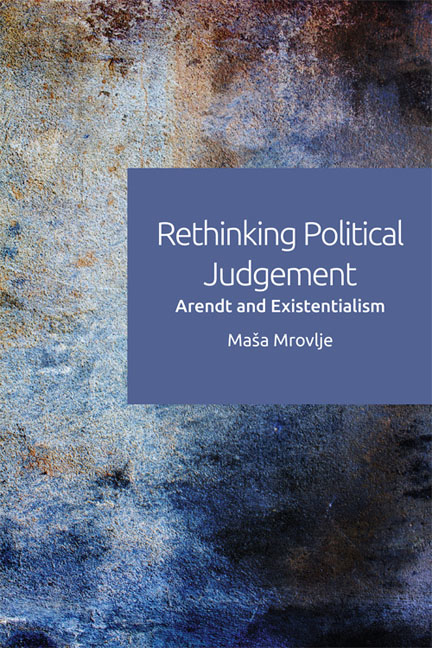Book contents
- Frontmatter
- Contents
- Acknowledgements
- Introduction
- 1 Political Judgement in the History of Political Thought and the Modern Crisis
- 2 Sartre and Beauvoir: The Ambiguity of Political Judgement and the Challenge of Freedom and Responsibility
- 3 Camus and Arendt: Confronting the Ambiguity of Political Judgement and Illuminating the Limits of the World
- 4 Political Judgement and Narrativity
- 5 Facing Up to the Tragedy of Political Action: The Problem of Dirty Hands
- 6 Times of Transition: Reconciling with the Tragic Nature of Political Affairs
- Conclusion: Reclaiming Wonder at the World of Political Affairs
- Bibliography
- Index
6 - Times of Transition: Reconciling with the Tragic Nature of Political Affairs
- Frontmatter
- Contents
- Acknowledgements
- Introduction
- 1 Political Judgement in the History of Political Thought and the Modern Crisis
- 2 Sartre and Beauvoir: The Ambiguity of Political Judgement and the Challenge of Freedom and Responsibility
- 3 Camus and Arendt: Confronting the Ambiguity of Political Judgement and Illuminating the Limits of the World
- 4 Political Judgement and Narrativity
- 5 Facing Up to the Tragedy of Political Action: The Problem of Dirty Hands
- 6 Times of Transition: Reconciling with the Tragic Nature of Political Affairs
- Conclusion: Reclaiming Wonder at the World of Political Affairs
- Bibliography
- Index
Summary
Echoing the promise of ‘Never again!’, the challenge of transitional justice and reconciliation represents a relatively recent attempt to confront the complexities of judging pasts of political violence, brutality and division so as to make possible a different and common future. Its guiding sensibility is a successor to the efforts at the Nuremberg trials to imagine possible ways of dealing with the painful experience of the Second World War and genocide that shook the consciousness of humankind. Since then, the need for transitional mechanisms arose following a spate of terror, mass killings and ethnic cleansing devouring places as diverse as South Africa, Chile, Argentina, Rwanda, Bosnia and countless others. On the one hand, the challenge of transitional justice crystallises awareness of the human capacity for cruelty and evil, which cannot simply be wished away through appeals to moral absolutes or faith in the progress of humanity. On the other hand, it contains an appeal to the need for humans to draw on their capacity to come to terms with what happened, to understand how and why, and make a new beginning in the future. The transitional justice problematic, in this respect, engenders the challenge of political judgement from another angle than the dirty hands problem: that of the spectators, who need to reconcile with the fallibility of human engagement in the world and in whom the tragedy of action meets the burden of responsibility.
This crucial concern of transitional justice and reconciliation scholarship notwithstanding, the judging process of assuming responsibility for the tragedy of political action has not been awarded sufficient attention or explored in its own right. The prevalent tendency remains to imagine a framework of judgement already in place on the basis of which to conclusively deal with a painful past and move confidently into a brighter future. As postmodern critics have been quick to point out, the challenge of transitional judgement is approached with a preconceived vision of agreement – of either a liberal or communitarian sort – whereby past violence can be redeemed and substituted for by a restored sense of justice and belonging (Hirsch 2011: 1–4; Schaap 2005a).
- Type
- Chapter
- Information
- Rethinking Political JudgementArendt and Existentialism, pp. 183 - 217Publisher: Edinburgh University PressPrint publication year: 2017

